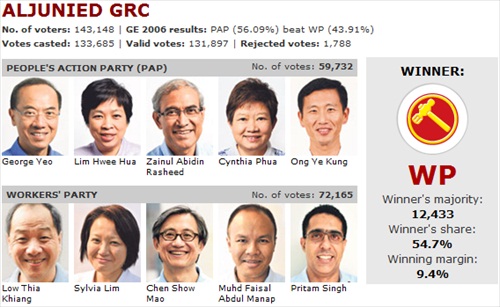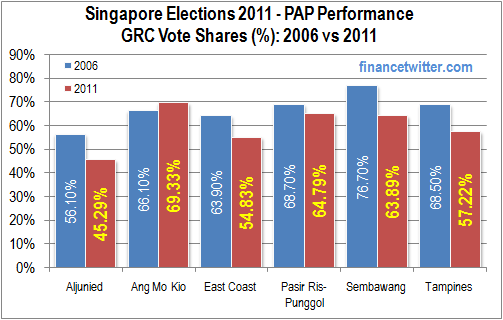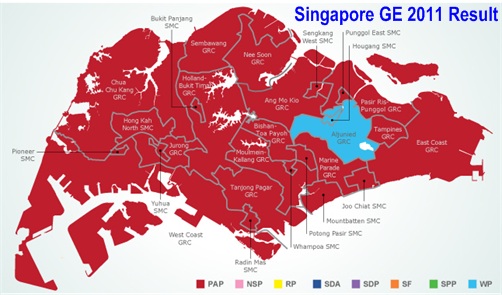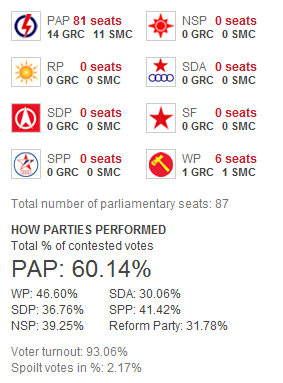Singapore GE-2011, Aljunied’s Giant Step Of Tsunami
As expected (*yawn*), the ruling People’s Action Party (PAP) retained firm control, winning 81 out of 87 seats contested. However this 2011 general election registered many “firsts”. For the first time, opposition candidates contested virtually every seat in parliament with the exception of Minister Mentor Lee Kuan Yew. For the first time, social media and the internet was allowed to be used and the opposition parties didn’t waste the opportunity to the max in the campaign as an alternative to state-controlled newspaper.
Also, for the first time Singapore’s ruling party PAP suffered its worst-ever election result since independence in 1965, thanks to the more daring young voters. PAP also saw its national vote share plunge to 60.14%, the lowest in all post-independence elections. And for the first time, the Singapore parliament will have the loudest voice or biggest opposition presence (six) since independence, thanks to opposition Worker’s Party (WP) who managed to capture Aljunied Group Representation Constituency (GRC) as well as retain their Hougang Single Member Constituency (SMC).

For the first time, the PAP lost a Group Representation Constituency (GRC) since they were created in 1988 to ensure Indians, Malays and other ethnic minorities were represented in parliament. Foreign Minister George Yeo and Second Finance Minister Lim Hwee Hua who are part of the PAP team lost their seats in the process. Aljunied was known to be a hot seat so much so that Minster Mentor Lee Kuan Yew said (or rather threaten?) during the campaign that Aljunied GRC voters have 5 years “to repent”.

It is indeed a sweet victory for the opposition Worker’s Party simply because PAP’s George Yeo is very popular amongst the voters. Given a choice, Aljunied GRC voters would rather vote out other arrogant PAP leaders including PM Lee Hsien Loong (if Lee switches place with George) but coincidently Aljunied is traditionally opposition stronghold hence they have to answer the call for a First World Parliament, not to mention the irresistible Worker’s Party A-team.
On a broader scope, it seems the tsunami that hit Malaysia’s Mar 2008 general election and the recent concluded mini-tsunami in Sarawak state election have brought after-shock to Singapore, one way or another. Generation-Y are more vocal and dare to vote for a change compare to their parents. While their parents owe the ruling government in bringing economic prosperity, the younger generation wants more than that such as freedom of speech. They feel it’s sufficient for their parents to repay the gratitude (by voting the ruling government) so they’re free to vote whoever they like.
Similar to Malaysia’s Mar 2008 general election, the popular vote Singapore’s ruling government PAP garnered this time is pathetic. PAP won 60.1% of the popular vote – less than the 61% it received in the 1991 elections a few months after Goh Chok Tong became prime minister. If you analyze the PAP performance in the GRC seats between 2006 and 2011 which saw a fight with the opposition (and not walkover), with the exception of Ang Mo Kio basically PAP’s vote share is seeing an obvious decline.
If the PAP continues to be arrogant and considers opposition was just lucky during this round of election, it had better wish the voters are equally forgiving in the next election especially in the GRC such as East Coast and Tampines. The new GRC of Nee Soon and Moulmein-Kallang which saw the opposition captured 41.61% and 41.44% of popular vote is evident that PAP can’t take things for granted as they’re ready to swing their votes to the opposition next round. Even GRC Marine Parade and Bishan-Toa Payoh which saw PAP enjoyed a walkover in 2006 are slipping away with the PAP capturing only 56.65% and 56.94% votes.

In total, East Coast, Tampines, Nee Soon, Moulmein-Kallang, Marine Parade and Bishan-Toa Payoh constitute 29 seats. Two-third majority means PAP needs at least 58 seats. In other words, if PAP were to lose more than 29 seats, they would lose their traditionally two-third majority. So, if the opposition can ensure the GRC Aljunied voters that they’ve made the correct decision and somehow PAP continues to sleep on the issues highlighted, the above 6 GRCs can potentially deliver another 29 seats to the opposition and PAP would then be in deep trouble.

No doubt, the PAP can still form the government with a simple-majority but it would be disastrous to the ruling government, which is unlikely given the current scenario. PAP should take the latest result seriously, unlike it’s neighbour Malaysia. Of course in Malaysia, the ruling government can still form the government even if they manage to win only 40% of vote in Peninsula Malaysia simply because vote-buying will ensure the vote-bank in Sabah and Sarawak deliver the desired seats, while the same cannot be said about Singapore’s politics.
Nevertheless Singapore is at its infancy as far as democracy in terms of freedom of speech is concerned. Singaporeans are still reluctant to speak openly against their government even on the internet, most probably due to the fear that their government has instil since day one. They have everything to lose and nothing to gain by critisizing the ruling government which has done a great job in preparing the basic necessities for the citizens. On the other hand, the opposition parties need to do more than presenting young and professional teams.

They need to learn the basic tactics in politic from Malaysia such as the consideration of forming partnership or even merger in order to prevent three or more corners fight with giant PAP in order to prevent vote-split. But above all, maybe both the ruling government an opposition should educate their citizens on how to reduce the spoilt or rejected votes. It’s amusing that a country such as Singapore has such a huge number of such votes. Nevertheless, the latest result shows the Singapore voters especially from the GRC Aljunied has taken a giant courages step in moving into a possibility of two-party system.

No comments:
Post a Comment